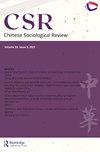Housing and Subjective Class Identification in Urban China
IF 1.4
2区 社会学
Q2 SOCIOLOGY
引用次数: 19
Abstract
Abstract Housing has become a major dimension of socioeconomic inequality in contemporary China. This study investigates the effects of homeownership and housing wealth on people’s subjective class identification in urban China. Using the data from the China Family Panel Studies (CFPS) from 2010 to 2016, we estimate fixed-effects models and show that growth in housing wealth improves people’s perceived social status, and the improvement is greater in more economically developed areas with higher real estate prices and greater housing inequality. Owning a home enhances subjective social class only in eastern coastal regions but not in inland regions. These findings suggest that as homeownership expands and becomes universal in a society, the psychological benefits of homeownership may diminish, but the subjective impact of housing wealth would increase. The study contributes to the literature on the social consequences of housing in a transitional society that is experiencing rapid housing privatization and increased housing stratification.中国城市住房与主观阶级认同
住房已成为当代中国社会经济不平等的一个主要方面。本研究考察了中国城市居民住房拥有率和住房财富对主观阶级认同的影响。利用中国家庭面板研究(CFPS) 2010 - 2016年的数据,我们估计了固定效应模型,结果表明,住房财富的增长提高了人们对社会地位的感知,并且在经济越发达、房地产价格越高、住房不平等程度越高的地区,这种改善更大。拥有住房只在东部沿海地区提升了主观社会阶层,而在内陆地区则没有。这些发现表明,随着住房所有权的扩大和在社会中变得普遍,住房所有权的心理好处可能会减少,但住房财富的主观影响会增加。这项研究对正在经历住房迅速私有化和住房分层增加的过渡社会中住房的社会后果的文献作出了贡献。
本文章由计算机程序翻译,如有差异,请以英文原文为准。
求助全文
约1分钟内获得全文
求助全文

 求助内容:
求助内容: 应助结果提醒方式:
应助结果提醒方式:


